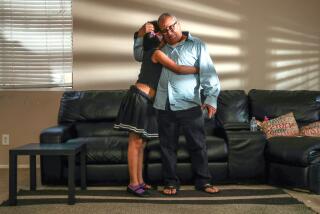Adoptive Mother’s Ordeal in a Tijuana Jail : Honored Heartland Family Shattered by Charges of International Baby-Buying
- Share via
HUDSON, Ill. — In the end, Bette Winks may simply have loved children too much. So much, some believe, that she wouldn’t let anything--not even the law--prevent her and her husband, Charles, from making as many children as possible part of their comfortable rural life here in the American Heartland.
After rearing eight children of their own, the Winkses began adopting severely handicapped youngsters, prompting the governor of Illinois to honor them in 1982 as an Adoptive Family of the Year--one of 12 statewide.
‘Couldn’t Turn Down a Child’
Eventually, the family brought in as many as 22 youngsters, most of them handicapped infants who were born as far away as New York and Oregon, or poor toddlers from the streets of Tijuana, Mexico.
“We just couldn’t turn down a child,” Bette Winks once remarked.
Today, the Winkses’ once-expansive family is shattered, its dissolution documented in voluminous court files, reams of newspaper clippings and comments from law enforcement authorities in Illinois, California and Mexico. Bette Winks, the former family matriarch and elementary school teacher, now bides her time in a Tijuana prison cell, far from her well-ordered home. Dispirited but unwilling to tell her story to reporters, she is awaiting the outcome of charges that she attempted to buy a 1-year-old Mexican girl for $3,000.
Authorities in Illinois and California have taken custody of 16 children formerly in the Winkses’ household--including 12 believed to have been Mexican-born--asserting that the youngsters were not adopted legally or were left without adequate care.
Ran Afoul of Regulations
Two other children have been returned by the family to a social service agency in Illinois, while three more are living with a baby sitter in this rural township. In her obsessive desire to have children, authorities say, Bette Winks ran afoul of the myriad regulations governing adoptions--particularly international adoptions, which involve a number of federal immigration procedures.
“I don’t think anyone doubts that she loved children,” said Ronald C. Dozier, the chief prosecutor in McLean County, Ill., whose office went to court and succeeded in preventing the Winkses from regaining custody of six of the seized children.
“But on the other hand, it gets to a point where it becomes pathological. . . . I think it became an obsession with her. . . .”
Added McLean County Sheriff Steve Brienen: “It was kind of an illegal ‘Cheaper by the Dozen.’ ”
The Winkses have denied ever buying or selling a child, insisting that they have just provided money for the care of the children and have never done anything illegal. No family member has ever been charged with a felony in the United States.
“I think my mom just wants kids so bad that she wants to get ‘em before the law’ll let her,” said Charles Howard Winks, 25, the eldest son and the only family member here who agreed to talk even generally about the case, as he manned the cash register of the family gas station in nearby Bloomington. “She really wants kids so bad she can’t wait.”
Legal Difficulties Cited
Law enforcement authorities cite legal difficulties to explain why neither state nor federal officials have lodged any formal allegations against the Winks family, beyond a local obstruction of justice charge pending against Bette Winks. Officials note the lack of a felony baby-buying statute in Illinois and the virtual absence of federal adoption oversight, other than the immigration law applied in international adoption cases.
The singular tale of the Winkses, offering glimpses into the murky world of underground adoptions, is spiced by details in state and federal court documents of quick trips to Tijuana and Louisiana in search of children and an alleged money-for-baby exchange at a suburban Chicago motel room, of the spirited efforts of a middle-aged schoolteacher and mother who apparently couldn’t stop acquiring children--and is now paying for it.
So convoluted are some details, and so glazed over with layers of questionable documents and purportedly false statements, that U.S. and Illinois authorities say some parts of the riddle--such as the true identities of the 12 Latino children taken from the Winkses--may never be solved.
Here in central Illinois, where corn and soybean fields stretch as far as the eye can see, two strongly divergent portraits have emerged of Bette Winks, herself an only child, who was the clear motivating force behind the family’s accumulation of children.
Friends, Critics Disagree
“In my opinion, she’s bullheaded, stubborn, opinionated, one-sided, and could care less about anything but herself,” said Sheriff Brienen, a law enforcement veteran of 19 years in Bloomington, the McLean County seat.
On the other side are the Winkses’ friends, family and other admirers, who portray her as a loving soul who simply has too much to give in a mistrustful world.
“They were a loving, close family,” said Margaret DeRosa, a longtime family friend who taught piano to the young Winkses.
“Now, I don’t go hardly anyplace I don’t hear gossip and bad talk about them. . . . I think they’re trying to crucify her.”
Replied Brienen: “We’re not talking about a vendetta against anybody. . . . We’re talking about kids. Where are their parents? Were they kidnaped? Were they sold in Mexico? . . . We have no way of knowing.”
Self-Identity Crises
Meanwhile, authorities said the seized Latino children, who are likely to be placed in permanent foster homes here in Midwestern farm country, may face future crises of self-identity.
“They may never fit in (here),” said Greg Fillmore, a detective in the sheriff’s office who worked on the case. “Their skin says they’re Hispanic, but they don’t know anything about themselves.”
Even Bette Winks’ most vocal critics acknowledge that the children received exemplary care, although state authorities wonder aloud how one family of limited means could adequately have cared for so many.
Visitors described her ranch-style seven-bedroom house as well-kept and orderly, and her children as impeccably well-groomed and cared-for on the family’s six-acre spread near this rural township.
Until their legal problems, in fact, the Winkses were in many ways a model family, having resided in the area since the mid-1960s after arriving from southern Illinois. Bette, a 49-year-old graduate of Illinois State University in nearby Normal, was a longtime elementary school teacher in Normal; Charles, 46, ran a successful service station in Bloomington.
Obsession or Calling?
Why did they want so many children? While critics see it as a kind of misguided obsession, others view it more kindly.
“They (the Winkses) don’t go out and socialize a lot, they don’t party, they don’t drink,” explained Charles Reynard, a Bloomington attorney who has represented the Winkses. “They commit all their personal and financial resources to raising their family. . . . They feel that’s why they were placed on this Earth.”
“My mom, basically, she just wants a lot of kids; she likes to take care of kids,” said Charles Howard Winks.
Few people outside of the Winkses’ close-knit circle knew just how many children were living under the Winkses’ roof.
“I never did take time to count ‘em all. I was too busy taking care of them,” recalled Nora Cramer, a Hudson resident who was the Winkses’ permanent baby sitter, receiving about $120 a week for taking care of up to 17 children.
Adopted Handicapped Children
The Winkses turned to adoption after the birth eight years ago of their youngest natural child, Andrew, who is afflicted with Down’s syndrome, a severe mental handicap.
The family soon legally adopted two other mentally disabled children, leading to the state award in 1982. They continued to adopt children, or attempted to adopt them, from New York, Oklahoma, Florida, California and Oregon. Most were mentally handicapped.
Soon, the Winkses’ telephone number was plugged into the informal but fertile national adoption network that quickly spreads word of available children.
At some point, Bette Winks’ growing number of contacts in the national network of private adoptions informed her of another source of children: Mexico. U.S. authorities describe the U.S.-Mexico border as a hotbed for baby-smuggling operations, which take advantage of the proliferation of poor infants in Mexico and the paucity of adoptable children in the United States.
Six Children in 1985
Court documents in Illinois and San Diego show that during 1985, the Winks family received six children--all believed to be Mexican-born--from various intermediaries, paying $4,500 each for at least two of them.
In a case related to the Winks matter, two San Diego women pleaded guilty in U.S. District Court in San Diego last year to concealing information from immigration authorities and conspiracy to illegally bring Mexican babies--including two Winks children--into the United States.
The Winks family saga began to unravel seriously on the morning of Friday, Sept. 13, 1985, when sheriff’s officials in McLean County said that an officer from the Lafayette, La., police force telephoned and informed them of evidence that a Louisiana woman had sold her 13-day-old son to the Winkses for $2,500 at a suburban Chicago motel room.
(The mother later pleaded guilty to a baby-selling charge in Louisiana. The Winkses were not charged.)
On that September evening, state and federal authorities raided the Winkses’ crowded rural household, taking what would turn out to be permanent custody of seven children--including the Louisiana infant and six babies apparently born in Mexico--for whom there appeared to be no proper documentation.
26 People in House
Authorities found 26 people in the house, including Bette and Charles Winks and their eight natural children. At least five children had severe disabilities; there were 14 children younger than 4 years of age.
“I may as well just kill myself,” Bette Winks told one state official after the raid, according to court papers.
After another raid in which three children were taken, Bette Winks, fed up and shaken, quit her school-teaching post last June and moved to Alhambra, Calif. She was apparently accompanied by six children who, since her arrest in Mexico, have been placed in foster care in Los Angeles County.
Bette Winks apparently lived in California in relative calm until Jan. 24, when she went to Tijuana--purportedly to buy an infant allegedly secured through a ruse from the child’s natural mother--and was arrested, along with an alleged accomplice.
Could Face 15-Year Term
She has denied the baby-buying charge, for which she faces a potential prison term of up to 15 years, asserting that she was just visiting.
Today, Bette Winks, one-time model Midwestern parent, cuts a bewildered and forlorn figure in the crowded brick fortress that is the municipal jail in Tijuana. Her hair, once auburn and perfectly coiffed, has become an unruly shock of washed-out white. Her face is gaunt and haggard. Rings of red surround her eyes. She puffs nervously on a cigarette.
“It’s worse than a nightmare,” Bette Winks, dressed in a red warm-up suit and speaking from behind metal bars and screen, told a reporter during a brief jail-house interview as she fought back tears.
“I want to go back to my family. . . . Do you know when I can go back to my family?”
More to Read
Sign up for Essential California
The most important California stories and recommendations in your inbox every morning.
You may occasionally receive promotional content from the Los Angeles Times.












